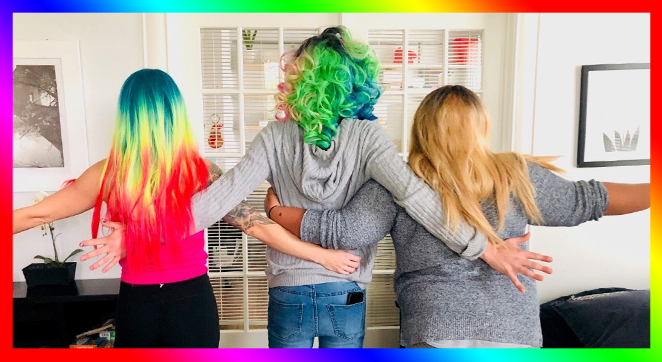PRIDE: Supporting survivors of trafficking
Written by SAFE
In our work to prevent trafficking and support survivors as they heal, we are constantly reminded that the intersections of different forms of oppression affect survivors differently – a Black trans woman faces different hurdles to healing from abuse than a bi Latinx man. Straight people do not encounter many of the barriers that LGBTQIA+ people experience during their everyday lives, and those barriers lead to and amplify abuse when it happens
Our team provides a community and services to help people who have experienced commercial sexual exploitation feel accepted, safe, and supported.
Increased risk
Sex trafficking is nefarious and knows no bounds, reaching across gender, sexual identity and expression, race, ethnicity, and socio-economic backgrounds. Traffickers prey on people who are struggling, and they are experts at identifying people’s vulnerabilities. Tragically, there are common threads that lead to increased risks and vulnerabilities, such as childhood sexual abuse, homeless or runaway, poverty, and instability within the home.
LGBTQIA+ people face high levels of violence, stigma, and discrimination, which traffickers prey on. Because of that and the hidden nature of commercial exploitation – which further stigmatizes victims – people in LGBTQIA+ communities are even less likely to report abuses.
The connection of homelessness and trafficking is well documented. As many as 64% of trafficking survivors report being homeless or experiencing unstable housing at the time they were recruited by a trafficker.
About 30% of trans adults have experienced homelessness in their lives, and 12% have experienced homelessness in the past year due to their transgender identity. The increased risk of homelessness also increases trans people’s risk of being trafficked for sex. On top of that, an estimated 20% of youth experiencing homelessness are LGBTQIA+. Young people who don’t have a home are more likely to engage in survival sex to meet their basic needs. And traffickers target them because they know they can take advantage of their heightened vulnerabilities.
The risk is real.
Resources for LGBTQIA+ communities
Right here in Austin, there are many organizations that provide support to LGBTQIA+ people and tailor their care to the individual needs of their clients. SAFE can provide counseling, advocacy, legal assistance, and shelter to anyone who has experienced trafficking, sexual assault, domestic violence, or child abuse. All SAFE programs and services are open and affirming of LGBTQIA+ communities.
In addition to our own resources for survivors, we connect people with other agencies that can provide additional support, including:
- Allgo
- Out Youth
- PFLAG
- Transgender Education Network of Texas
- Waterloo Counseling Center
- AIDS Services of Austin
If you would like to connect with SAFE or our partner agencies, you can contact our free, 24/7 SAFEline by phone at 512.267.SAFE (7233), by text at 737.888.7233, or online chat at safeaustin.org/chat. For Deaf, DeafBlind, DeafDisabled, Late-Deafened, and Hard of Hearing people, please use relay/VRS.